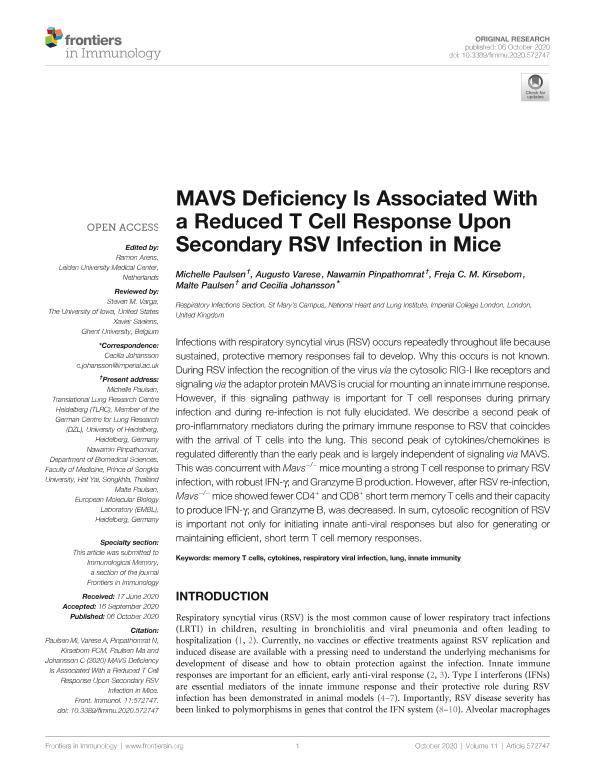Artículo
MAVS Deficiency Is Associated With a Reduced T Cell Response Upon Secondary RSV Infection in Mice
Paulsen, Michelle; Varese, Augusto ; Pinpathomrat, Nawamin; Kirsebom, Freja C. M.; Paulsen, Malte; Johansson, Cecilia
; Pinpathomrat, Nawamin; Kirsebom, Freja C. M.; Paulsen, Malte; Johansson, Cecilia
 ; Pinpathomrat, Nawamin; Kirsebom, Freja C. M.; Paulsen, Malte; Johansson, Cecilia
; Pinpathomrat, Nawamin; Kirsebom, Freja C. M.; Paulsen, Malte; Johansson, Cecilia
Fecha de publicación:
10/2020
Editorial:
Frontiers Media
Revista:
Frontiers in Immunology
ISSN:
1664-3224
Idioma:
Inglés
Tipo de recurso:
Artículo publicado
Clasificación temática:
Resumen
Infections with respiratory syncytial virus (RSV) occurs repeatedly throughout life because sustained, protective memory responses fail to develop. Why this occurs is not known. During RSV infection the recognition of the virus via the cytosolic RIG-I like receptors and signaling via the adaptor protein MAVS is crucial for mounting an innate immune response. However, if this signaling pathway is important for T cell responses during primary infection and during re-infection is not fully elucidated. We describe a second peak of pro-inflammatory mediators during the primary immune response to RSV that coincides with the arrival of T cells into the lung. This second peak of cytokines/chemokines is regulated differently than the early peak and is largely independent of signaling via MAVS. This was concurrent with Mavs−/− mice mounting a strong T cell response to primary RSV infection, with robust IFN-γ; and Granzyme B production. However, after RSV re-infection, Mavs−/− mice showed fewer CD4+ and CD8+ short term memory T cells and their capacity to produce IFN-γ; and Granzyme B, was decreased. In sum, cytosolic recognition of RSV is important not only for initiating innate anti-viral responses but also for generating or maintaining efficient, short term T cell memory responses.
Palabras clave:
CYTOKINES
,
INNATE IMMUNITY
,
LUNG
,
MEMORY T CELLS
,
RESPIRATORY VIRAL INFECTION
Archivos asociados
Licencia
Identificadores
Colecciones
Articulos(INBIRS)
Articulos de INSTITUTO DE INVESTIGACIONES BIOMEDICAS EN RETROVIRUS Y SIDA
Articulos de INSTITUTO DE INVESTIGACIONES BIOMEDICAS EN RETROVIRUS Y SIDA
Citación
Paulsen, Michelle; Varese, Augusto; Pinpathomrat, Nawamin; Kirsebom, Freja C. M.; Paulsen, Malte; et al.; MAVS Deficiency Is Associated With a Reduced T Cell Response Upon Secondary RSV Infection in Mice; Frontiers Media; Frontiers in Immunology; 11; 10-2020; 1-11
Compartir
Altmétricas



